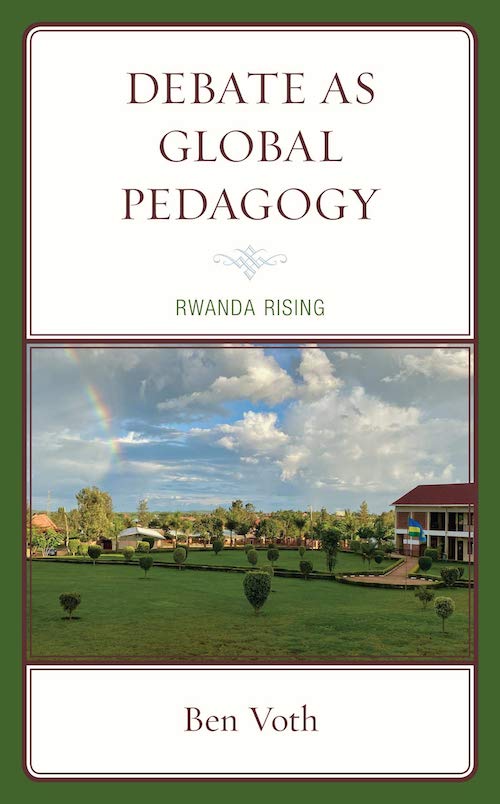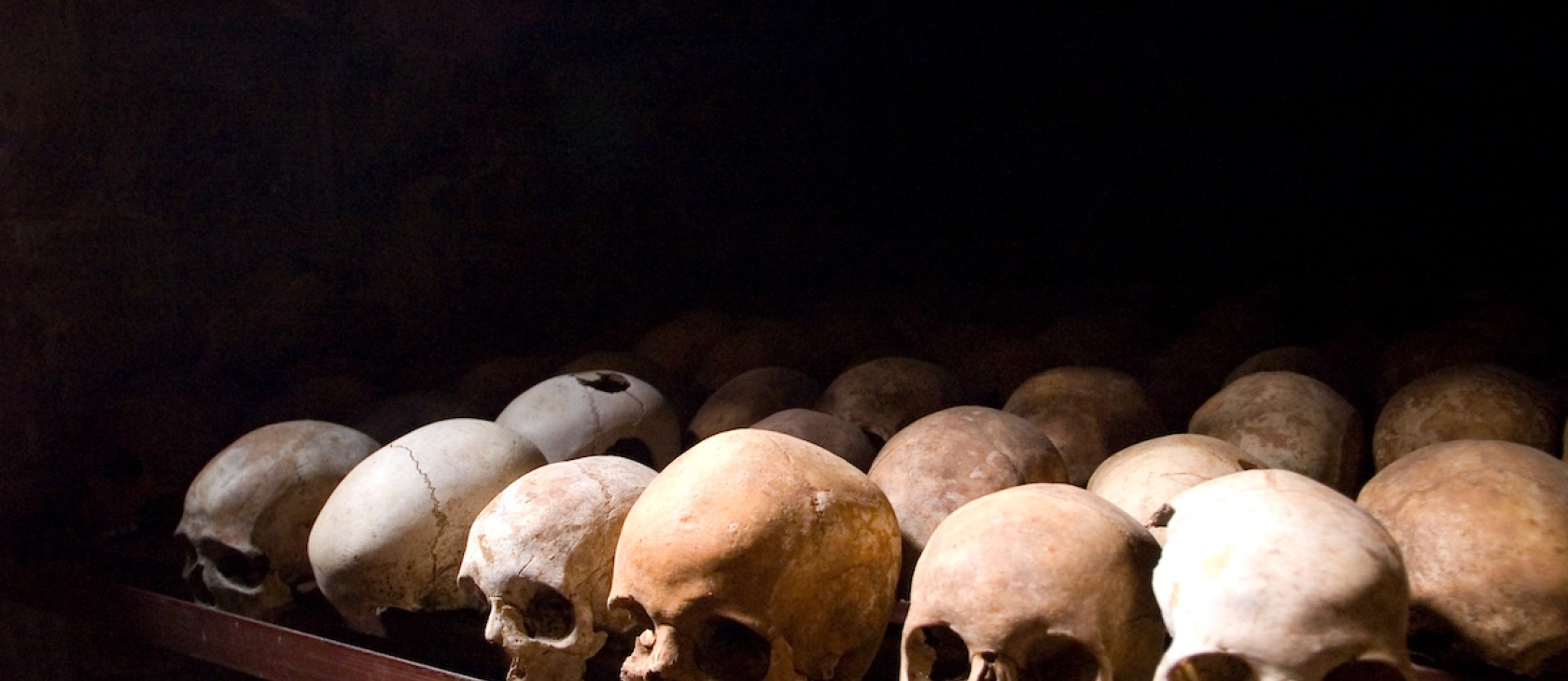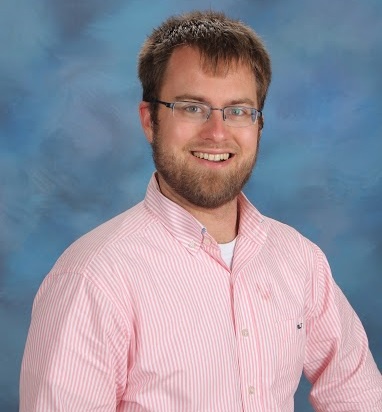In November of 2021, the National Communications Association presented the prestigious Daniel Rohrer Memorial Outstanding Research Award for top monograph in the field of communication studies to Dr. Ben Voth for his Debate as Global Pedagogy: Rwanda Rising. Voth’s award is well deserved. Debate as Global Pedagogy presents a cogent argument for and a persuasive vision of the power of debate to affect change within those willing to engage in this exercise. Could debate bring healing to survivors of mass violence and offer hope to war-torn nations?
The ability to articulate and listen to diverse views without demonizing opponents is helping to revive genocide-ravaged areas like Rwanda. It could also do much to bridge the divides in the U.S.

By Ben Voth
(Lexington Books, 2021)
The theoretical portion of Debate as Global Pedagogy builds upon Voth’s previous work in The Rhetoric of Genocide. Voth sees genocide as developing out of the dehumanization of the other. When propaganda presented the minority Tutsis as “vermin” and “cockroaches” to the majority Hutu community, the groundwork was laid for 1.4 million Rwandans* to be murdered in 100 days. “Political leadership makes pejorative symbolic misrepresentations of an internal public group, and the repetition of these symbolic misrepresentations forms the foundation of individual action collectively galvanized toward the common act of genocide.” In a country of just less than 6 million inhabitants, the death of 25% of the population is astounding. While many factors contributed to the Rwandan genocide, Voth focuses on the communication element, contending that a single narrative dehumanized the minority population to an astonishing extent. Preventing this kind of brutalizing narrative in the future is the work of “discursive complexity.” Voth defines this as “the capacity among individuals and a society to endure and encourage dissent.” In the absence of discursive complexity, a single narrative permits abuse, murder, and genocide of the other as defined by the narrative’s propaganda. Voth traces the lack of discursive complexity through other genocides in the 20th century history: “The twentieth century confounded us with the most detailed documentation of the horrors of human society. The genocides of African Hereroes [sic], Armenian Christians, Jews in the Holocaust, intellectuals in Cambodia, Muslims in Bosnia, and more than any book can contain add up to tens of millions dead and four times as many as those killed in war.” The greatest need for the global community, according to Voth, is to reduce the likelihood that genocide will occur again by increasing discursive complexity. Minimizing that possibility, Voth argues, is the province of competitive debate.
Voth coached a nationally award-winning debate team at Miami University of Ohio and currently coaches Southern Methodist University (SMU)’s collegiate debate program. He is the Debate Fellow for the Calvin Coolidge Presidential Foundation and widely recognized within collegiate debate circles as an excellent coach. It should be no surprise, then, that Voth has thought carefully about debate. He sees it as an exercise that requires students to listen to opposing viewpoints, carefully evaluate them, and respond. These actions occur within a game-like atmosphere that forges friendships through participation, developing habits that last a lifetime.
Central chapters of Debate as Global Pedagogy focus on Voth’s work with Jean Michel Habineza and the formation of iDebate Rwanda, a summer program that instructs Rwandan students and teachers in the art of debate. Voth sees this process as helping the post-genocide generation move beyond the horrors of the recent past into a positive future for Rwanda. Where the Rwandan education system previously concentrated ethnic prejudices within educational authority, the cultivation of debate develops within students the ability to evaluate claims, weigh evidence, and respond respectfully to false information. Combined with a consistent focus on helping students to develop their own voices, debate, Voth argues, places discursive complexity at the center of the new Rwanda rising from the ashes of genocidal prejudice (120). Habineza explains that “in debate you learn that conflict is inevitable, but that violence is a choice. Embedded into this activity is this idea that a conflict of ideas could lead to a positive outcome that can be revolutionary for societies that are recovering from violent conflicts” (118). Debate, Voth argues, is a mechanism that reduces the possibility of genocide and replaces it with the ability both to articulate and listen to diverse views. Through the inculcation of discursive complexity, debate makes the world more free and increases the potential for human flourishing.
Voth contends that when an atmosphere of free discussion in the marketplace of ideas develops, the conditions for human happiness rise.
Throughout Debate as Global Pedagogy, Voth returns to his core argument several times, illustrating it in different ways. As a teacher, Voth is a consummate storyteller. He describes his first trip to Rwanda encountering survivors of the genocide. He takes the reader into the complexities of teaching the children of survivors and murderers to face and listen to one another; his journey also narrates the rural and urban settings of Rwandan education. In his wider scholarship, Voth has studied the life of American civil rights activist James Farmer Jr. extensively and the way in which debate helped shape the civil rights movement. He describes taking his SMU students to key places in Farmer’s life and in the civil rights movement, working to inspire them to see how they can contribute to creating a better world. Perhaps the most powerful story Voth tells involves his work with Holocaust survivors. A former student of his worked in the Holocaust Museum and connected Voth to the Holocaust Museum staff when they were faced with a particular problem: In the face of Holocaust denial, the staff wanted survivors to tell their stories of suffering and survival. Voth traveled to Washington, D.C., for a series of workshops to help survivors learn to express their stories in a public manner. Working with these survivors led Voth to conclude that “I originally thought of the museum as an epideictic commemoration of one of humanity’s most savage acts—a sobering memorial to a terrible tragedy. I now view it as an ongoing heroic story of human voices rising out of the ashes of genocide. ... The museum has a much more positive message than I originally understood. The survivors are heroes within the defeated scenes of the Holocaust” (177). Voth also focuses on places within American culture where discursive complexity seems to be waning, dedicating chapters to the rise of Afropessimist theory in communication studies, which claims that any scholarship suggesting that African Americans have made social progress fails to understand the reality of systemic racism, as well as the ways in which the climate change narrative rejects complicating theories in favor of a single, politically motivated advocacy. Voth would rather see the scientific community engage in discursive complexity as opposed to banning alternate views as unscientific. As complications are flattened and opposing views are silenced, the possibility for wrong actions increases. Voth contends that when an atmosphere of free discussion in the marketplace of ideas develops, the conditions for human happiness rise.
Overall, Voth’s book is a helpful contribution to both the field of communications and the debate community. He explores a theoretical concept and applies it to the world practically and clearly. There is room for improvement in a future edition, however. Throughout Debate as Global Pedagogy, typos and obtuse syntax reveal that stronger editing would have produced a better volume. At least two chapters are ancillary to the primary argument: Chapter 5 addresses debate within historically black colleges and universities (HBCUs) but without advancing the case for discursive complexity, and chapter 8 looks at two different routes Guatemala could take after the removal of a dictatorship. At 251 pages currently, a future edition could streamline the argument by removing such adjacent topics. Several chapters are co-written, resulting in different styles and voices throughout the book. Reworking chapters to have a consistent voice would enhance its readability. Additionally, Voth’s argument implies that debate should expand as an educational activity on a global scale. Developing a more popular level version of this academic book would reach different audiences who will not encounter works from an academic press.
While Voth is an academic writing for an academic audience, Debate as a Global Pedagogy highlights the ways his academic research serves communities beyond the academy. Through his scholarship, communities in both Rwanda and the United States have moved toward greater flourishing, something for which we should all be grateful.




